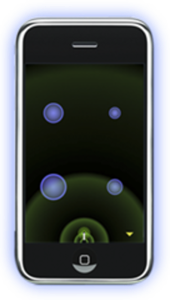The Web is full of examples where developers have built technology for an express purpose, only to have that technology adopted by users or other developers to deliver unforeseen – and often wildly popular – solutions. Flickr – originally a small subset of functionality in a much larger game – comes to mind. As does YouTube, which had its humble beginnings in the world of online dating. And now, the iPhone may be joining those ranks.

It’s safe to assume that when the folks at Apple finally released the iPhone, the concept of converting it into “something that replicated an ancient ceramic woodwind instrument” probably wasn’t on their list of things to do. And yet, the folks at Smule have done just that with Ocarina, an iPhone app that has skyrocketed to becoming the #1 paid app in the world – in one week.
Seven days ago, The Unofficial Apple Weblog was providing a first look at Ocarina, dubbing it a must-have for “Zelda nerds.” Today, David Cowan of Bessemer Venture Partners is using Ocarina as an example of what startups today should be doing.
Even more impressive? The Ocarina app, currently priced at $0.99 US, is the number one paid iPhone app in Austria, Australia, Belgium, Canada, Denmark, Finland, France, Greece, Holland, Hong Kong, Hungary, Portugal, Spain, Switzerland, Sweden, and the US. It’s also in the Top 5 for a handful of other countries.

So how did an application that turns an iPhone user into a pale imitation of the master of the pan flute become such an overnight sensation? Well, there are a five specific things working in its favor.
First, it’s a musical instrument. A quick glimpse at the top paid iPhone apps shows Ocarina shares the list with a guitar, drums, and a piano. Some of today’s most popular games on traditional gaming platforms revolve around the emulation of rock stars and their bands. Shortcutting your way to musical stardom is the most popular thing around.
But why is Ocarina more popular than traditional instruments on the iPhone platform? Size for one thing. It’s the only popular instrument app where the iPhone actually replicates the instrument form factor. But I think it has another distinct advantage, as well. The number of people who actually know how to play the instrument is infinitesimal – as is the number of people who know what it should sound like. So no one is likely to show you up. What’s more, pretty much anything that comes out of the app sounds strangely appealing.
Second, it’s social. One of the most interesting aspects of Ocarina is the ability to see who else on earth – at this very moment – is either completely slaughtering music as we know it or belting out an amazing tune. Every person playing the app has the option to broadcast their Ocarina warblings, which causes their tune to radiate from their position on the globe. Aside from being an interesting study in data visualization, that gives Ocarina the same voyeuristic appeal of any social networking site.
Third, it’s fun and completely addictive. For some odd reason, you simply cannot put the app down. It’s simple to learn and nearly impossible to master. (I’ve had to stop writing this post any number of times just to pick up my iPhone and muck with it again.)
Fourth, Ocarina picked a pricing model that iTunes users are already conditioned to understand: the $0.99 purchase. It’s rarely enough for an individual to give it a second thought and yet, in bulk, it’s enough to generate a real revenue stream for a company.
Finally, for all its seeming simplicity, Ocarina is actually one of the most inclusive uses of the iPhone and its capabilities. The app takes advantage of the touch screen, the microphone, the accelerometer, and the location and presence information. It is incredibly responsive to user input and that gives users the feeling that they’re “actually doing something.”
When you break it down, it comes as little surprise that Ocarina is as popular as it is. But hindsight is 20-20. Did the developers actually foresee this success or did it just seem like an interesting creative pursuit? An even better question: does it matter?
One thing’s for sure, Ocarina is a runaway hit driving some very real revenue for Smule – and it has the potential to become one of those “must-have” iPhone apps for every user. Here’s hoping it’s not a one-hit wonder for the folks at Smule.
To purchase the application for the iPhone, visit the Ocarina page in the App Store.

















